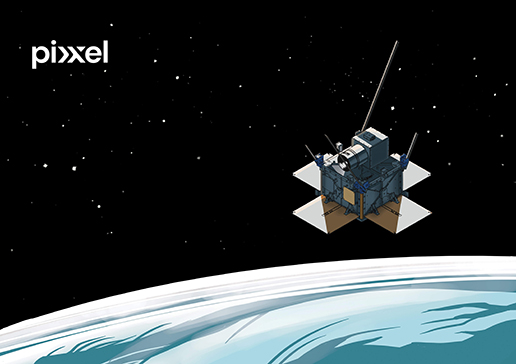5 Space Tech Startups Revolutionizing the Space Race in India Discover how a new generation of entrepreneurs is transforming India's space sector


By Abhya Adlakha
In the vast expanse of the cosmos, a new space race is unfolding, and India is launching itself into the forefront with remarkable vigour. The year 2022 marked a pivotal moment for India’s space aspirations, with the country’s first private rocket launch capturing global attention. Moreover, not only did India become the first nation to land on the Moon’s south pole with Chandrayaan-3, the nation also launched its first dedicated sun-observing spacecraft, Aditya L1. These milestones weren’t just a flash in the pan; it was the culmination of years of quiet innovation and the sign of an exciting new era.
In 2023, as many as 100 space tech startups registered with the Indian Space Research Organization (ISRO). This was fuelled by the government setting a zero-percent GST regime for space tech startups — effectively providing entrepreneurs with a launchpad for unparalleled innovation. Moreover, in January 2023, Microsoft also joined hands with ISRO to fuel the growth of space tech startups in India. The numbers speak volumes: Indian space tech startups have secured approximately $233 million in funding between 2014 and May 2023, spread across more than 30 deals. Industry experts project that by 2030, this sector could reach a staggering market size of $77 billion.
Let’s spotlight five trailblazing space tech start-ups that are leading the space race in India and are redefining what’s possible — one innovation at a time.
Pixxel


Founded in 2019 by BITS Pilani alumni Awais Ahmed and Kshitij Khandelwal, Pixxel focuses on developing high-resolution Earth observation satellites. This Bengaluru-based startup is crafting a constellation of high-resolution hyperspectral imaging satellites that promise to revolutionize how we view our planet.
Pixxel’s satellites are like the Earth’s personal Instagram filters, capturing images in over 150 spectral bands. This level of detail allows for unprecedented analysis of our planet’s surface, from monitoring crop health to detecting gas leaks. With their third satellite, Anand, successfully launched in November 2022, Pixxel is proving that good things come in small packages – their microsatellites weigh just 15 kg but pack an analytical punch.
The startup’s vision has caught the eye of big players, with Google and Accenture among their investors. As Pixxel prepares to launch six commercial satellites, they’re not just reaching for the stars – they’re bringing the Earth’s stories back in vivid, multi-spectral detail.
The startup has secured over $36 million in funding from investors including Google, Omnivore VC, and Radical Ventures. They’ve also created a user-friendly software platform for data visualization and analysis and have published research papers on the versatile applications of hyperspectral data.
Dhruva Space
Sanjay Nekkanti’s brainchild, Dhruva Space, has been in orbit since 2012, making it a seasoned player in India’s space tech scene. Based in Hyderabad, this startup specializes in providing integrated solutions for space-based applications by offering satellites, earth stations, and launching services as a comprehensive package.
Dhruva Space made history in 2021 as the first Indian private entity to bag an order for designing and developing space-qualified solar arrays from scratch. But they didn’t stop there. In 2023, they successfully tested their satellite orbital deployers and ‘Orbital Link,’ showcasing their ability to not just build satellites but also get them comfortably settled in space.
With their full-stack space engineering solutions, Dhruva Space is proving that in the space game, versatility is key.
Bellatrix Aerospace
Since 2015, Bellatrix Aerospace has been working on the cosmic equivalent of fuel efficiency. Founded by Rohan M Ganapathy and Yashas Karanam, this Bangalore-based startup is all about getting satellites from point A to point B in the most efficient way possible.
Bellatrix is the master of thrusters, developing propulsion systems for satellites of all sizes. The startup is dedicated to making space more accessible and affordable for various applications. One of its key areas of emphasis is the development of propulsion systems, or thrusters, for heavy (>2 ton), micro, and nanosatellites. Their innovations have caught ISRO’s eye, resulting in a coveted order from the space agency. With four unique thrusters under their belt and global patents to boot, Bellatrix is proving that sometimes, it’s not about the destination, but how efficiently you get there.
The startup’s green propulsion technologies are not just good for satellites; they’re good for space. In June 2023, they signed a contract with the Government of Karnataka to set up a $76 million factory in Bangalore which will focus on environmentally friendly propulsion technologies for small satellites.
Agnikul
Founded in 2017 by Srinath Ravichandran, Moin SPM, and SR Chakravarthy, Agnikul is an Indian private space launch vehicle startup company headquartered in Chennai, Tamil Nadu. This startup is revolutionizing rocket manufacturing with its 3D-printed engines.
Agnikul made waves by building its own launchpad and mission control center at the Satish Dhawan Space Centre in Sriharikota. Their partnerships with ISRO and IN-SPACe have positioned them at the forefront of private space exploration in India.
With their 3D-printed rocket engines, Agnikul is not just thinking outside the box; they’re printing a whole new one. Their approach promises to make space launches more accessible and cost-effective, potentially opening up the final frontier to a wider range of missions and explorers.
The space tech startup has garnered support from notable angel investors, including Sriram Krishnan of Andreessen Horowitz, Anand Mahindra, Nithin Kamath of Zerodha, and Naval Ravikant of AngelList.
Skyroot
Skyroot, founded in 2018 by Pawan Kumar Chandana and Naga Bharath Daka, is writing a new chapter in India’s space history. Named after Vikram Sarabhai, the father of the Indian space program, their Vikram series of rockets carries forward a legacy of innovation and exploration.
In November 2022, Skyroot etched its name in the annals of space history by becoming the first private Indian company to launch a rocket into space. Their Vikram-S rocket’s successful launch from Sriharikota was a giant leap for India’s private space sector.
With three rockets in production – Vikram I, II, and III – Skyroot is offering a range of options for satellite launches. Their claim of being able to assemble and launch rockets within 24-72 hours is nothing short of revolutionary, promising to make space more accessible than ever before.
The Indian space tech sector is no longer playing catch-up; it’s charting its own course among the stars. With supportive government policies, increasing private investment, and a pool of brilliant minds, India is poised to become a major player in the global space economy. As we look to the future, one thing is clear: India’s space odyssey is just beginning.
More from our site
Recent Posts
Luxury’s Most Recent & Vibrant Launches This Season
The luxury landscape is brimming with bold innovations, striking partnerships, and immersive experiences
The luxury landscape is brimming with bold innovations, striking partnerships, and immersive experiences
The PEAKLIFE Regatta 2025
From fashion designer Varoin Marwah’s Coastal Calm SS '25 splash show to a thrilling nautical spin on the sea, it was a magical weekend in Mumbai
From fashion designer Varoin Marwah’s Coastal Calm SS '25 splash show to a thrilling nautical…
Inside Louisiana’s Biggest Festival: 10 Things You Didn’t Know About Mardi Gras
More than a party, Mardi Gras is a cultural phenomenon!
More than a party, Mardi Gras is a cultural phenomenon!
Design Your Dream Home With These Expert Tips
A home that’s stylish, cosy, and truly yours!
A home that’s stylish, cosy, and truly yours!
Luxury in Fiji: Indulge in Paradise
From private island resorts to lavish overwater bungalows, this South Pacific paradise seamlessly blends indulgence with natural beauty
From private island resorts to lavish overwater bungalows, this South Pacific paradise seamlessly blends indulgence…
A Traveller’s Quest: Soorahi
This premium blend whisky brand aims to reflect a spirit of exploration and evolution in India’s alco-beverage landscape
This premium blend whisky brand aims to reflect a spirit of exploration and evolution in…

